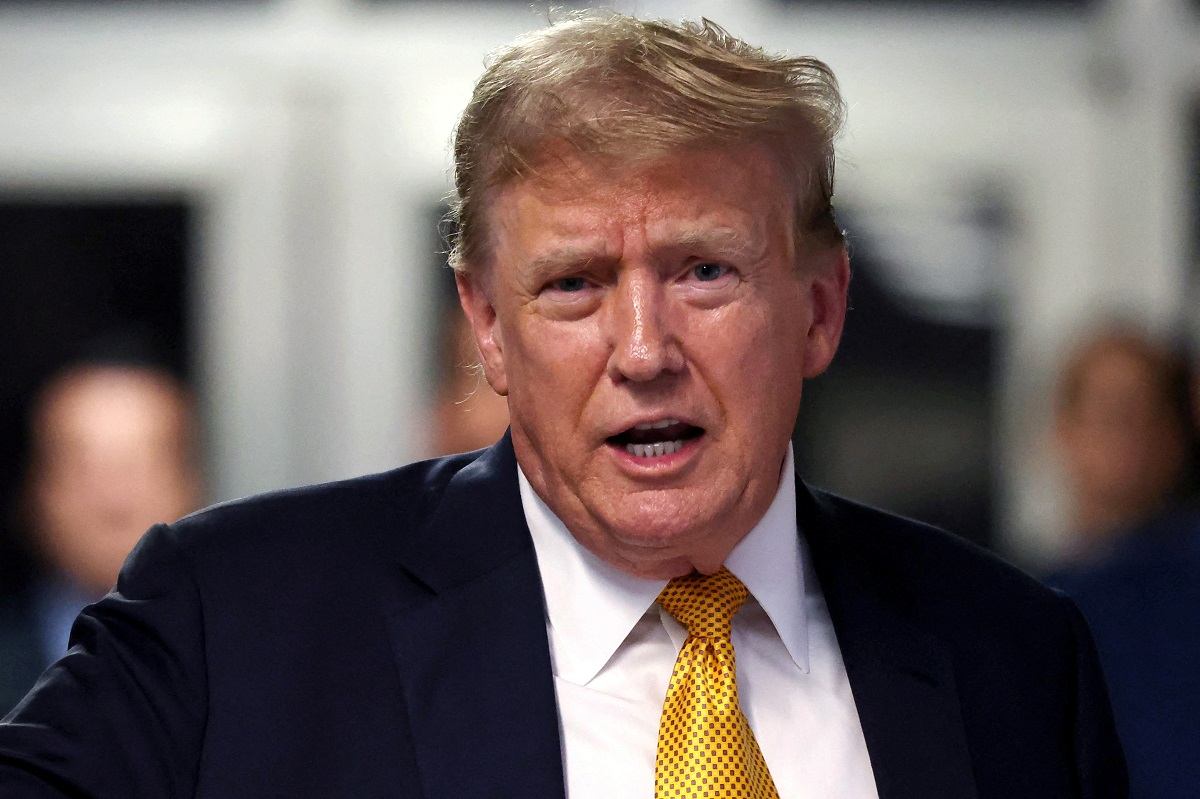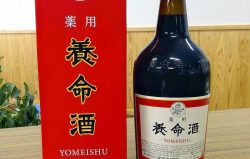
Former U.S. President Donald Trump speaks at the end of the day during his hush money trial at Manhattan Criminal Court in New York City, New York, U.S. May 21, 2024.
13:09 JST, May 22, 2024
NEW YORK – Donald Trump’s defense team rested its case Tuesday without calling him to the stand, wrapping up testimony and setting the stage for closing arguments next week in a historic trial that could impact the upcoming presidential election.
A jury of 12 New Yorkers will soon be given the momentous task of issuing judgment in the first criminal trial of a former U.S. president – one who is also the presumptive 2024 Republican nominee and has denounced the proceedings in regular diatribes outside the courtroom.
Jurors, their identities shielded from the public, have spent the last five weeks hearing testimony in the case, in which Trump is charged with falsifying business records to cover up a hush money payment before the 2016 presidential election to the adult-film actress Stormy Daniels, who had alleged a sexual encounter with him.
They learned about tabloid “catch and kill” tactics for buying stories and not publishing them, and how Trump’s campaign panicked when the “Access Hollywood” recording, in which he bragged about grabbing women’s genitals, was publicized weeks before the 2016 election. And they listened to darker testimony, too, including Daniels’s depiction of what sounded at times like nonconsensual sex with Trump.
Throughout it all, Trump sat nearby at the defense table, sometimes glowering and sometimes closing his eyes, with a rotating coterie of political allies and acolytes often flocking into the courtroom behind him.
After prosecutors and defense attorneys make their closing arguments next Tuesday, the judge will charge the jury, giving them the complex legal road map meant to guide them toward a verdict. Then the jurors will begin deliberations. Their decision could have far-reaching consequences for American politics and law, with Trump barreling toward a November rematch with President Biden.
Prosecutors and defense attorneys spent Tuesday afternoon at a hearing known as a charging conference, where they sparred over what, exactly, jurors should be told before deliberations. Both sides submitted suggested jury instructions or changes in certain wording, but New York Supreme Court Justice Juan Merchan said he is not likely to accept changes from New York State’s standard jury instructions without good reason.
“Where there are standard pattern instructions, I don’t deviate,” Merchan said. He told attorneys he would send them a draft of his instructions on Thursday, and further discussions or proposed changes could follow from both sides.
How the judge instructs the jury is a pivotal and often dull part of the process. Like reading furniture assembly instructions written in an unfamiliar language, juries can often struggle with the dense terminology of a judge’s charge. It is common during deliberations for panels to ask for specific parts of the charge to be read back to them so they can try to better understand the instructions.
In this trial, Merchan’s charge will be particularly important because of the legal framework that prosecutors built toward indicting Trump on 34 felony counts of falsifying business records. That crime can be charged as a misdemeanor, but it can be elevated to a felony if the records were falsified in furtherance of another crime.
Prosecutors argue that the other crime in this case was violating state election law 17-152 – conspiracy to promote or prevent an election. That law makes it a misdemeanor when two or more people “conspire to promote or prevent the election of any person to a public office by unlawful means.”
Prosecutors have said in court that the “unlawful means” at issue in Trump’s case were a violation of federal campaign law – meaning that the charges against him are really a three-step process.
The key witness against Trump, his former lawyer Michael Cohen, testified that he paid $130,000 to Daniels, the adult-film actress, to prevent her from going public with her claim of a night of sex with Trump years earlier. Cohen says he was reimbursed by Trump the following year in payments disguised as a legal retainer. Those transactions, according to prosecutors, amount to falsified business records.
Trump has long assailed this case – along with the three other indictments he faces in Florida, Georgia and Washington, D.C. – as politically motivated. He frequently lambasted the New York prosecution in remarks to reporters in a hallway outside the courtroom.
Leaving court Tuesday, Trump again attacked Merchan, saying the judge, who immigrated to the U.S. from Colombia as a child, was biased against him. “Take a look at where he comes from,” Trump said.
At the charging conference, the prosecutors and defense team debated how best to explain all of the labyrinthine legalese to a jury made up mostly of non-lawyers. The judge’s determinations of the legal threshold for conviction may have a huge impact on what jurors think of the evidence – assuming they can follow the charging language.
While a judge decides the law, a jury’s job is to decide the facts. Throughout a trial, those roles typically do not overlap much. But the charging conference is a pivotal moment when the judge is preparing to formally turn the case over to the jurors – with a set of instructions.
Merchan seemed poised to rule against prosecutors over what may be a critical issue in deliberations – whether to tell the jury that Trump can be convicted if the panel finds that falsified records entries were “reasonably foreseeable” based on his actions.
“I don’t like the reasonably foreseeable language,” Merchan said.
Prosecutors want the jury to be told that Trump’s role in the alleged crimes doesn’t need to be explicit – that he “made or caused” the false business records to be made. But defense attorneys pushed back on that.
Merchan also grew annoyed that the defense team tried to get language into the charge suggesting that Trump made decisions based on the involvement of his lawyers. The judge has previously ruled that since Trump has not sought to make an “advice of counsel” defense, he cannot try to raise the issue with the jury.
“I find it disingenuous,” Merchan said.
When Emil Bove, one of Trump’s attorneys, stood up to speak further, Merchan said: “Please don’t get up. … This is something you have been trying to get through to the jury for many, many months. It’s denied, it’s not going to happen.”
As Merchan made those remarks, Trump muttered something to his attorney Susan Necheles and shook his head slightly. He appeared bothered by the judge’s comments and his decision.
The charging conference, taking place on the 20th day of Trump’s trial, came a few hours after the final witness testimony in the case. Robert Costello, an attorney who had advised Michael Cohen in 2018 and was called by Trump’s side, finished his testimony in the morning, returning after his behavior on the stand greatly angered Merchan a day earlier.
Defense lawyers rested when Costello finished. They did not call Trump, which was a highly risky legal option that never seemed likely – but that Trump repeatedly teased as a possibility in many of his public rants about the trial.
Had Trump taken the stand, prosecutors could have asked him about a host of other issues, including a recent civil court case in which a judge concluded that he and others carried out a financial fraud and his two court losses to the writer E. Jean Carroll, who sued him for defamation.
During his second day on the stand, Costello was less confrontational with the judge, though he grew testy when a prosecutor suggested he was operating on behalf of Rudy Giuliani and Donald Trump when he gave Cohen legal advice in 2018. Prosecutor Susan Hoffinger read an email in which Costello, writing about Cohen, said, “perhaps we have been played here.”
“Do you want me to explain it?” Costello asked.
“No,” Hoffinger replied.
When she asked a follow-up question, Costello replied sarcastically, “Now, you do want me to explain it?”
The defense had called Costello as part of their broader effort to paint Cohen, the most critical witness against Trump, as an untrustworthy liar. Prosecutors, in turn, attacked Costello, suggesting he worked in 2018 as a kind of stalking horse for then-President Trump and Giuliani, a longtime personal friend of Costello’s.
Hoffinger pointedly asked Costello if he was trying to exact his own kind of revenge against Cohen after their legal discussions soured.
“You still have a lot of animosity against Michael Cohen don’t you?” she asked. Costello denied that he did.
She then noted that he testified last week to the House of Representatives about Cohen, at the time that Cohen was testifying in Trump’s trial.
“It was an effort by you to intimidate Michael Cohen?” Hoffinger asked.
“Ridiculous, no,” Costello answered.
Bove finished up the evidentiary portion of the trial by asking questions aimed at showing that Costello, like most everyone else who dealt with Cohen, found him to be an erratic and unbelievable hothead.
“Did you ever pressure Michael Cohen to do anything?” Bove asked.
“I did not,” Costello replied.
“Did you ever have control over Michael Cohen?” Bove asked.
“Completely not,” Costello said.
Top Articles in News Services
-

Survey Shows False Election Info Perceived as True
-

Hong Kong Ex-Publisher Jimmy Lai’s Sentence Raises International Outcry as China Defends It
-

Japan’s Nikkei Stock Average Touches 58,000 as Yen, Jgbs Rally on Election Fallout (UPDATE 1)
-

Japan’s Nikkei Stock Average Falls as US-Iran Tensions Unsettle Investors (UPDATE 1)
-

Trump Names Former Federal Reserve Governor Warsh as the Next Fed Chair, Replacing Powell
JN ACCESS RANKING
-

Producer Behind Pop Group XG Arrested for Cocaine Possession
-

Japan PM Takaichi’s Cabinet Resigns en Masse
-

Man Infected with Measles Reportedly Dined at Restaurant in Tokyo Station
-

Israeli Ambassador to Japan Speaks about Japan’s Role in the Reconstruction of Gaza
-

Videos Plagiarized, Reposted with False Subtitles Claiming ‘Ryukyu Belongs to China’; Anti-China False Information Also Posted in Japan


























